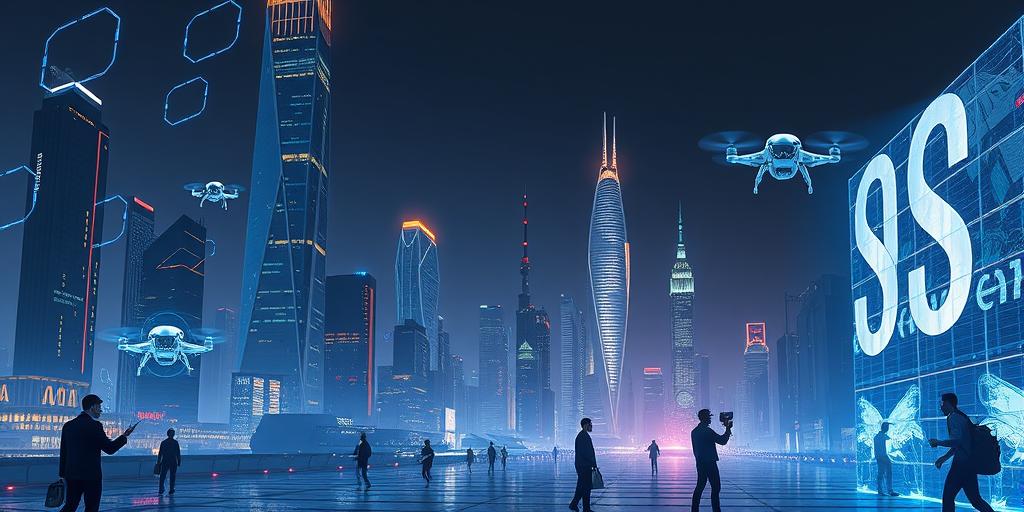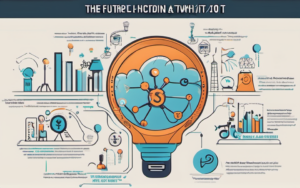The Future of Work is rapidly evolving, driven by the convergence of emerging technologies that are reshaping the way we live and work. From artificial intelligence (AI) to the Internet of Things (IoT), these advancements are creating both challenges and opportunities, prompting us to reimagine the skills and adaptability needed to thrive in the years to come.
The Evolving Landscape of Work
The landscape of work has been undergoing a significant transformation, fueled by technological advancements that are automating tasks, creating new job roles, and redefining the very nature of work itself.
The Impact of Automation
Automation has been a driving force behind the changes we’re witnessing in the workplace. It’s automating repetitive tasks and processes, leading to increased efficiency and productivity. While automation can eliminate certain jobs, it also creates new opportunities in areas like engineering, data analysis, and software development.
The Rise of Artificial Intelligence
Artificial intelligence (AI) is playing an increasingly important role in the Future of Work, with its ability to learn and adapt to perform complex tasks, analyze data, and make decisions. AI-powered tools are finding applications in various industries, from healthcare and finance to manufacturing and customer service.
The Role of Data and Analytics
Data and analytics are becoming essential for organizations to gain insights, make informed decisions, and optimize operations. The ability to collect, analyze, and interpret data is becoming increasingly important in the modern workplace.
Emerging Technologies Shaping the Future of Work
Emerging technologies are driving the transformation of the Future of Work, creating new possibilities and shaping the skills and knowledge needed to succeed.
Artificial Intelligence (AI) and Machine Learning (ML)
AI and machine learning (ML) are revolutionizing the way we work, automating tasks, improving decision-making, and personalizing experiences.
AI-Powered Automation
AI is automating routine tasks, freeing up human workers to focus on more complex and creative endeavors. From chatbots handling customer inquiries to AI-powered robots performing repetitive tasks in manufacturing, AI is streamlining processes and boosting productivity.
AI-Driven Decision Making
AI is being used to analyze vast amounts of data and provide insights that support better decision-making. AI algorithms can identify patterns and trends that humans might miss, leading to more informed and effective decisions.
Cloud Computing and Big Data
Cloud computing and big data are transforming the way organizations store, access, and analyze information. The cloud provides flexible and scalable computing resources, while big data analytics allows organizations to extract valuable insights from massive datasets.
Cloud-Based Collaboration
Cloud computing enables seamless collaboration among teams, regardless of location. Cloud-based tools like Google Workspace and Microsoft Teams facilitate communication, project management, and file sharing, creating a more connected and efficient workplace.
Data-Driven Insights
The ability to analyze and interpret big data is becoming increasingly valuable. Organizations are using big data analytics to identify trends, predict customer behavior, optimize operations, and make better business decisions.
Internet of Things (IoT)
The Internet of Things (IoT) is connecting devices, sensors, and systems, creating a network of interconnected objects that collect and share data.
Connected Workplaces
IoT devices are transforming workplaces, enabling remote monitoring, data collection, and real-time insights. Smart sensors can track equipment performance, optimize energy usage, and improve safety.
Remote Monitoring and Control
IoT enables remote monitoring and control of equipment and processes, enhancing efficiency and productivity. Remote monitoring allows for proactive maintenance, reducing downtime and improving operational efficiency.
The Future Workforce: Skills and Adaptability
The Future of Work demands a workforce that is adaptable, skilled, and capable of learning new technologies and skills throughout their careers.
Demand for Technical Skills
The rapid adoption of technology is driving a demand for technical skills, including programming, data analysis, cloud computing, and cybersecurity. These skills are essential for navigating the digital world and leveraging emerging technologies.
Importance of Soft Skills
While technical skills are crucial, soft skills such as communication, collaboration, creativity, critical thinking, and problem-solving are equally important. These skills enable individuals to work effectively in teams, adapt to change, and thrive in a rapidly evolving workplace.
Lifelong Learning and Adaptability
The Future of Work requires continuous learning and adaptation. As technology evolves, new skills and knowledge will be in demand. Individuals need to embrace lifelong learning, staying current with emerging trends and developing new skills throughout their careers.
Challenges and Opportunities
The Future of Work presents both challenges and opportunities. While emerging technologies can create new opportunities and improve productivity, they also raise concerns about job displacement and the need for reskilling.
Job Displacement and Reskilling
Automation and AI are automating certain tasks, leading to job displacement in some sectors. It’s crucial to address the challenge of job displacement by providing opportunities for reskilling and upskilling, equipping workers with the skills needed for the jobs of the future.
Ethical Considerations in AI and Automation
The use of AI and automation raises ethical concerns, including bias in algorithms, data privacy, and the potential for job displacement. It’s essential to develop ethical guidelines and regulations to ensure responsible and fair use of these technologies.
The Future of Work: A Collaborative Approach
Creating a more equitable and sustainable Future of Work requires collaboration between governments, businesses, and education institutions. This involves investing in education and training programs, promoting innovation, and creating a workforce that is adaptable and skilled for the jobs of the future.
Embracing the Future of Work
The Future of Work is an exciting and challenging time, offering opportunities for innovation, growth, and a more equitable and sustainable workplace.
The Importance of Innovation and Adaptability
Organizations and individuals need to embrace innovation and adaptability to thrive in the Future of Work. This involves investing in new technologies, developing new skills, and staying ahead of emerging trends.
The Role of Education and Training
Education and training play a critical role in preparing the workforce for the Future of Work. Investing in education and training programs that equip individuals with the skills and knowledge needed to succeed in the digital economy is crucial.
A Vision for a More Equitable and Sustainable Future of Work
The Future of Work offers the potential for a more equitable and sustainable future. By embracing innovation, investing in education, and promoting collaboration, we can create a workplace that is inclusive, fulfilling, and benefits all members of society. This vision requires a shared commitment to creating a more just and sustainable future for all.




